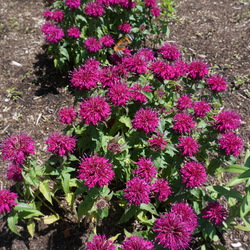 North Shore Plant Club
North Shore Plant Club
- Shop For Plants
- Search Plants
- Resources for Gardeners
- Color Wheel of Plants
- Interactive Landscapes
- Photos of Planters & Hanging Baskets
- September Photos from Our Community
- Botanic Gardens: Chicago & Beyond
- Local Nurseries
- Upcoming Plant Events
- Articles about Plants & Gardening
- Chicagoland Garden Calendar
- Explaining Plant Container Sizes
- Thrillers, Fillers & Spillers
- Join Free!
- Mundelein
Bee Balm (Monarda)
|
|
| Deciduous Perennial in the Lamiaceae Family | |
About Bee BalmsBee balm is the garden's firecracker—bold, fragrant, and buzzing with life. Its wild, shaggy blooms look like nature’s punk rock hairdo, and pollinators can’t get enough. Hummingbirds? Obsessed. Bees? Ecstatic. You? Delighted. There are several native Monardas, and a growing number of cultivars... All are low-maintenance, and smells like minty heaven. Grow bee balm—your garden party just got a headliner. Bee balm is an herbaceous perennial in the Lamiaceae (mint) family. Native to the North Carolina mountains, it may be seen along the Blue Ridge Parkway flowering during the summer months. Monarda smells very similar to the rind of a Bergamot Orange, one of the main ingredients in Earl Grey tea. You’ll smell the spicy herbal notes on the air if you get anywhere near this plant, and its leaves can be used in salads or a tea of its own to enjoy more of this unique scent. This plant prefers moist, well-drained soils and full sun but will tolerate some shade. Bee balm can reach a height of 4 feet and will spread rapidly by underground stolons. Blossoms attract bees, hummingbirds, and butterflies, and the leaves have a minty aroma when crushed. |
|
Plant Data | |
| Mature Size | 12 - 48 inches tall. 12 - 36 inches wide. |
| Moisture Tolerance | The first sign that your bee balm is in trouble will be drooping leaves. Unless you are getting regular rainfall, water the plant with at least an inch of water per week. |
| Zones | 3a - 9b (Usually hardy to -40° F) |
| Tags | Attracts Birds, Attracts Butterflies, Attracts Hummingbirds, Attracts Pollinators, Container, Deciduous, Deer Resistant, Formal Garden, Fragrant Foliage, Full Sun, Good for Butterfly Garden, Good for Cottage Garden, Good for Cut Flowers, Good for Mass Planting, Good for Rain Garden, Medium, Native to North America, Non-Allergenic, Normal Soil, Perennial, Pond, Rabbit Resistant, Showy Flowers, Tolerant of Loamy Soil, Tolerant of Moist Soil, Tolerant of Salt, Well-Drained Soil, Wet Site Tolerant, Woodland Garden |
| Bloom Period | Spring - Fall |
| Animals That Use It |
: |
Rankings |
|
Related Articles |
|
|
|
More Info from Experts |
|

 Beebalm - Jacob Cline
Beebalm - Jacob Cline


















